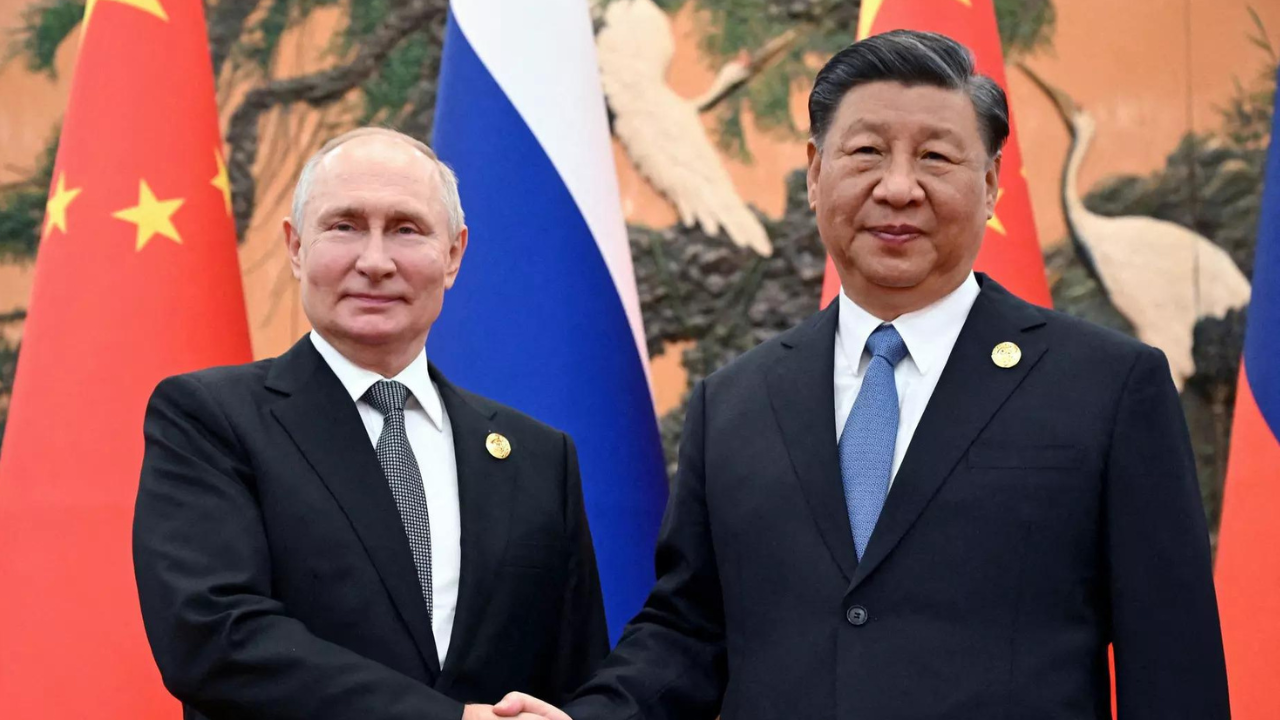[ad_1]
Putin, 71, who extended his nearly quarter-century rule in tightly controlled March elections, will visit Beijing starting May 16, as well as the northern city of Harbin where he’ll take part in the opening ceremony of the eighth Russian-Chinese Expo.He is likely to prioritize countering the US warnings to China over trade with his country at talks with Chinese President Xi Jinping.
The two leaders, who declared a “no-limits friendship” just weeks before Putin invaded Ukraine, have met more than 40 times since Xi came to power in 2012. China, which has helped Russia weather unprecedented US and European sanctions imposed over the Kremlin’s invasion of its neighbor, has faced increasing US threats of retaliation.
The world’s second-largest economy has become an indispensable ally for Russia, which relies on China as a market for its energy and supplier of its wartime needs. That’s put Putin in a sometimes awkward position, with Beijing wary of his nuclear sabre-rattling and mindful of the need to keep unfettered access to the US-led global economic system.
Putin’s decision to make Beijing his first foreign destination since his inauguration last week shows that “China is without a doubt our main partner,” said Fyodor Lukyanov, head of the Council on Foreign and Defense Policy, which advises the Kremlin. “In some aspects, we’ve no other alternative.”
The visit comes just days after Putin appointed Andrey Belousov, an economist and technocrat, as his new defense minister, replacing the long-serving Sergei Shoigu in a signal the Russian leader sees an extended conflict ahead. Several other prominent officials, some with experience working with China, kept their current roles. Deputy Prime Minister Alexander Novak, who oversees Russia’s relations with the OPEC+ group of oil-exporting nations, retained his position, while adding oversight of the nation’s economy to his responsibilities.
In addition to a one-on-one meeting with Xi, Putin also will be joined by both Belousov and Shoigu for closed-door talks, Kremlin foreign policy aide Yuri Ushakov said, according to the Interfax news service. Novak, Foreign Minister Sergei Lavrov and Bank of Russia Governor Elvira Nabiullina are among a host of other officials that will also participate in talks, he said.
In recent weeks, the US has stepped up warnings to Chinese banks and exporters about consequences if they help to bolster Russia’s military capacity.
In December, the Treasury Department announced it would impose secondary sanctions on banks that facilitate deals in which Russia procures semiconductors, ball bearings and other equipment necessary for its military — even if they’re unaware they’re doing so.
Banking transactions between Russia and China in general have now hit obstacles, according to Alexander Gabuev, director of the Carnegie Russia Eurasia Center and an expert on Russia-China ties. “The chilling effect of US policy is already there,” he said.
The two leaders and their top officials could look for solutions such as designating smaller banks with no exposure to the US financial system to handle transactions with Russia, said Gabuev.
The Chinese ambassador to Russia, Zhang Hanhui, said in an interview with Russian state TV last week that US sanctions have caused “some disturbance” in trade between the two countries. He added that the “two sides are actively holding consultations and striving to find effective solutions as soon as possible.”
In a written interview with China’s official Xinhua News Agency published Wednesday, Putin said he was confident in the economic relationship with Beijing.
Driven by Russian oil and gas sales and purchases of electronics, industrial equipment and cars, Moscow’s trade with China hit a record $240 billion in 2023, more than double the $108 billion reached in 2020.
Despite the growing economic ties, China’s exports to Russia were down 13% in April from a year earlier, the second month in a row of an annual decrease, according to Chinese customs data. Russian media reported that Chinese banks in late March began blocking payments from companies in Russia buying components for electronic assembly.
“It has become a tradition for the two heads of states to visit each other in the first overseas trips of their respective new presidential terms,” a display of mutual trust, said Wang Yiwei, a professor of international relations at Renmin University in Beijing.
However, Beijing doesn’t want to be seen as tied to Russia’s war machine, he said. “China wants to build a multi-polar world with partners including European nations — as President Xi’s recent trip showed — not just with Russia,” said Wang, who was also a former Chinese diplomat to the European Union. Xi traveled to France, Serbia and Hungary last week, seeking to promote China as a reliable partner.
On the energy front, negotiating a new supply contract with China will be on the agenda. Russia has all but lost its position in the European gas market in the wake of the invasion, and gas giant Gazprom PJSC sees China, the world’s largest energy importer, as a replacement.
Currently, Gazprom ships natural gas to China through just one route, the Power of Siberia pipeline. Deliveries have been growing gradually and are planned to reach an annual record of 38 billion cubic meters next year. They are set to increase by a further 10 billion cubic meters, with supplies starting from 2027, under a separate contract signed in 2022.
Russia’s ambition is to reach another agreement with China, with one option being a potential new Power of Siberia 2 link through Mongolia, which could lift Gazprom’s eastbound deliveries by 50 billion cubic meters a year.
While Putin and Xi may discuss the contract when they meet, the Russian side does not expect a final agreement this time around, according to a person familiar with the matter.
Even if China and Russia did agree on a new deal, Gazprom’s flows to the Asian nation wouldn’t exceed half of what it used to ship to Europe, and would be less lucrative, with the price for Russian gas to China lower than for remaining European clients through at least 2027, according to an economic outlook prepared by the Economy Ministry.
Yet another source of worry for Russia is Ukraine’s bid to rally international support for a June conference in Switzerland aimed at promoting Kyiv’s demand for a Russian troop withdrawal from occupied territory as a pre-condition for any peace agreement.
“The key here is whether China attends or not,” said Lukyanov from the Council on Foreign and Defense Policy. “Moscow takes into account the risk that the conference will create the impression on the world stage that everyone is for peace except Russia.”
Still, China is continuing to sell more than $300 million a month of dual-use components to Russia identified by the US and its allies as essential for making weapons such as missiles, drones and tanks, according to a study by the Carnegie Endowment for International Peace published May 6.
Providing components rather than weapons allows Beijing to claim plausible deniability, while supporting Russia diverts American resources away from the Indo-Pacific where China and the US are in competition, the study said.
For China, “they don’t want Russia to lose” the war in Ukraine, Carnegie’s Gabuev said.
function loadGtagEvents(isGoogleCampaignActive) { if (!isGoogleCampaignActive) { return; } var id = document.getElementById('toi-plus-google-campaign'); if (id) { return; } (function(f, b, e, v, n, t, s) { t = b.createElement(e); t.async = !0; t.defer = !0; t.src = v; t.id = 'toi-plus-google-campaign'; s = b.getElementsByTagName(e)[0]; s.parentNode.insertBefore(t, s); })(f, b, e, 'https://www.googletagmanager.com/gtag/js?id=AW-877820074', n, t, s); };
function loadSurvicateJs(allowedSurvicateSections = []){ const section = window.location.pathname.split('/')[1] const isHomePageAllowed = window.location.pathname === '/' && allowedSurvicateSections.includes('homepage')
if(allowedSurvicateSections.includes(section) || isHomePageAllowed){ (function(w) { var s = document.createElement('script'); s.src="https://survey.survicate.com/workspaces/0be6ae9845d14a7c8ff08a7a00bd9b21/web_surveys.js"; s.async = true; var e = document.getElementsByTagName('script')[0]; e.parentNode.insertBefore(s, e); })(window); }
}
window.TimesApps = window.TimesApps || {};
var TimesApps = window.TimesApps;
TimesApps.toiPlusEvents = function(config) {
var isConfigAvailable = "toiplus_site_settings" in f && "isFBCampaignActive" in f.toiplus_site_settings && "isGoogleCampaignActive" in f.toiplus_site_settings;
var isPrimeUser = window.isPrime;
if (isConfigAvailable && !isPrimeUser) {
loadGtagEvents(f.toiplus_site_settings.isGoogleCampaignActive);
loadFBEvents(f.toiplus_site_settings.isFBCampaignActive);
loadSurvicateJs(f.toiplus_site_settings.allowedSurvicateSections);
} else {
var JarvisUrl="https://vsp1jarvispvt.indiatimes.com/v1/feeds/toi_plus/site_settings/643526e21443833f0c454615?db_env=published";
window.getFromClient(JarvisUrl, function(config){
if (config) {
loadGtagEvents(config?.isGoogleCampaignActive);
loadFBEvents(config?.isFBCampaignActive);
loadSurvicateJs(config?.allowedSurvicateSections);
}
})
}
};
})(
window,
document,
'script',
);
[ad_2]
Source link






